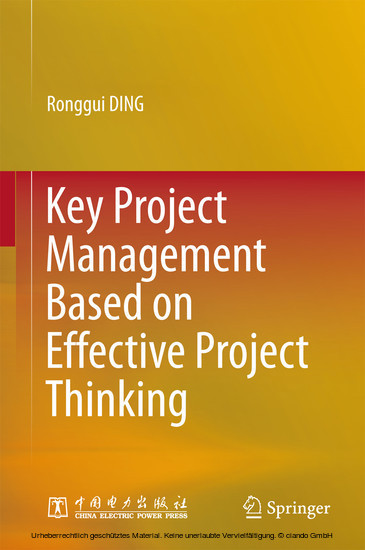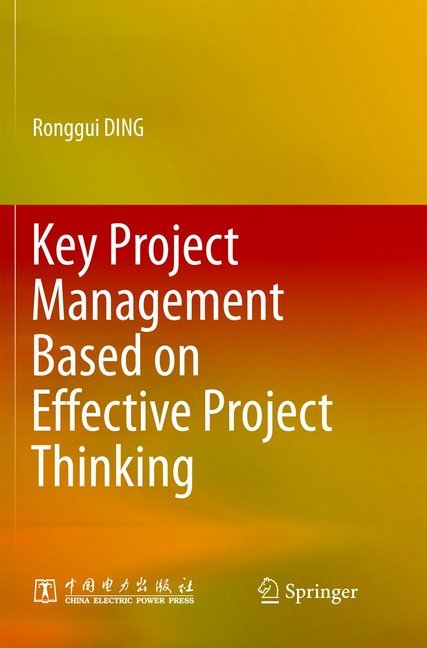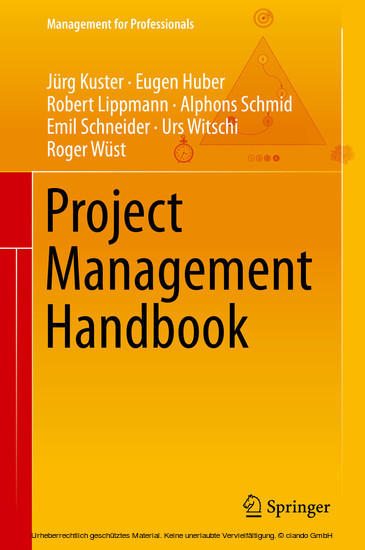Key Project Management Based on Effective Project Thinking
This book provides an effective overall approach and concrete action strategies to help readers quickly grasp key aspects of project management and reduce the pressure during the learning process, so that they can soon start enjoying the fruits of successful project management. The problems discussed in this book have been drawn both from several years of theoretical research on the part of the author, and from communications between the author and hundreds of business executives and project managers from many domestic and international EMBA and CEO classes. The book's unique content is written in an easy-to-follow tone with typical Chinese systemic and dialectical thinking, intended to help readers find the appropriate way to solve problems as they encounter them.
One of the popular misunderstandings about project management is to make project managers to take most of the responsibilities for project success, i.e. senior managers in companies usually think project management is not their business. This book puts project management in business context to eliminate this misunderstanding and demonstrates that: only if the senior managers recognize the value of projects and play their roles in project governance and project management right, their companies can survive and develop in the changing society. In order to solve the contradiction between the uniqueness of a project and the efficiency/reliability of its management, this book examines, based on Chinese dial
ectical logic, the basic preparation needed for successful project management, including how to use unified principles to manage projects with different characteristics, how to create company-wide project governance infrastructure to make project managers to be able to take their management responsibilities, and how to establish effective relationships among project stakeholders to make unique projects to be manageable structured partner social networks, etc. This book explains how to deal with the key contradictions existing in each phase of a project, from project decision-making to close-out.
This book is basically for both top managers of companies and project managers, so it addresses many challenges companies and project managers will have to face in the changing society, and provides essential strategies and methods for overcoming them.
This book is not an another book to talk about project management knowledge or successful project management stories, it is about basic project thinking and corresponding insights to deal with key common issues in projects, which are essential to manage projects and even companies reliably in the changing and unreliable society.
Prof. Ronggui Ding is the director of Project Management Institute in Shandong University, China. He received his PhD degree on Systems Engineering in Okayama University (Japan) and Tianjin University (China) in 1997, and got IPMA C-level certificate in 2001. He is now the vice president of Beijing Project Management Association and a well-known professor of Shandong University. He has been teaching project management, especially project governance and project human resource management for EMBA (Executive Master of Business Administration) and EDP (Executive Developing Program) and MPM (Master of Project Management) students in more than 10 universities in China, UK, South Africa and Italy for more than 10 years. He has trained more than 10 thousand senior managers in different countries, industries and government sectors. His books on project management are also well accepted by project managers and corporate managers. Because of his outstanding research outputs, he was honoured as an excellent talent by China Ministry of Education in 2007. Since 2006, he has been an IPMA (International Project Management Association) Award Assessor/Team Lead Assessor/Assessor Trainer and assessed projects in Germany, Russia, Italy, Iran, etc. He was a member of the IPMA Award Management Board from 2007 to
One of the popular misunderstandings about project management is to make project managers to take most of the responsibilities for project success, i.e. senior managers in companies usually think project management is not their business. This book puts project management in business context to eliminate this misunderstanding and demonstrates that: only if the senior managers recognize the value of projects and play their roles in project governance and project management right, their companies can survive and develop in the changing society. In order to solve the contradiction between the uniqueness of a project and the efficiency/reliability of its management, this book examines, based on Chinese dial
ectical logic, the basic preparation needed for successful project management, including how to use unified principles to manage projects with different characteristics, how to create company-wide project governance infrastructure to make project managers to be able to take their management responsibilities, and how to establish effective relationships among project stakeholders to make unique projects to be manageable structured partner social networks, etc. This book explains how to deal with the key contradictions existing in each phase of a project, from project decision-making to close-out.
This book is basically for both top managers of companies and project managers, so it addresses many challenges companies and project managers will have to face in the changing society, and provides essential strategies and methods for overcoming them.
This book is not an another book to talk about project management knowledge or successful project management stories, it is about basic project thinking and corresponding insights to deal with key common issues in projects, which are essential to manage projects and even companies reliably in the changing and unreliable society.
Prof. Ronggui Ding is the director of Project Management Institute in Shandong University, China. He received his PhD degree on Systems Engineering in Okayama University (Japan) and Tianjin University (China) in 1997, and got IPMA C-level certificate in 2001. He is now the vice president of Beijing Project Management Association and a well-known professor of Shandong University. He has been teaching project management, especially project governance and project human resource management for EMBA (Executive Master of Business Administration) and EDP (Executive Developing Program) and MPM (Master of Project Management) students in more than 10 universities in China, UK, South Africa and Italy for more than 10 years. He has trained more than 10 thousand senior managers in different countries, industries and government sectors. His books on project management are also well accepted by project managers and corporate managers. Because of his outstanding research outputs, he was honoured as an excellent talent by China Ministry of Education in 2007. Since 2006, he has been an IPMA (International Project Management Association) Award Assessor/Team Lead Assessor/Assessor Trainer and assessed projects in Germany, Russia, Italy, Iran, etc. He was a member of the IPMA Award Management Board from 2007 to
1;Foreword to the First Edition;5 2;Preface to the First Edition;7 3;Preface;10 4;Contents;14 5;1 Recognize the True Value of Management;18 5.1;1.1 Company Profit Comes from the Profit Model Rather Than Management;18 5.2;1.2 The Value of Management Lies in Improving Efficiency and Reducing Risks;23 5.3;1.3 The Understanding of Personality Is the Foundation of Effective Management;27 5.4;1.4 Fundamentals of Effective Management;30 6;2 Enterprise Cannot Survive Without Projects;34 6.1;2.1 Issues Associated with Successful Experiences;34 6.2;2.2 Effective Measures to Deal with Changes;37 6.3;2.3 Project Paves Way for Enterprise Success;45 7;3 Fundamental Principles of Project Management;54 7.1;3.1 Project Management is Based on Principles;55 7.2;3.2 Awareness of Project Stakeholders;59 7.3;3.3 Manage the Project Life Cycle;64 7.4;3.4 Steps to Achieve Project Management Solutions;68 8;4 The Development of Project Governance Platforms;73 8.1;4.1 The Responsibilities Assumed by Project Managers Are Very Limited;73 8.2;4.2 Enterprises Need to Improve Their Project Governance Capabilities;76 8.3;4.3 The Composition of Enterprise Project Governance Platforms;82 9;5 Successful Project Decision-Making;90 9.1;5.1 Clarifying Aims and Objectives;91 9.2;5.2 Identifying Project Stakeholders;94 9.3;5.3 Exploring Stakeholders' Requirements and Expectations;99 9.4;5.4 Seeking Ways to Meet Stakeholders' Requirements;103 9.5;5.5 Evaluate if a Project Can Achieve Its Aims;108 10;6 Defect-Free Project Initiation;110 10.1;6.1 Initiated with Fanaticism and Ended with Failure;110 10.2;6.2 Project Management Is an Iterative Process;111 10.3;6.3 Project Initiation Is the Responsibility of the Top Managers in an Enterprise;116 10.4;6.4 The Responsibilities of the Typical Project Stakeholders;118 10.5;6.5 The Roles of the Stakeholders in "General Projects";124 10.6;6.6 The Challenge of Defining Project Requirements;127 10.7;6.7 Project Charter that Is Distributed to All Stakeholders;129 10.8;6.8 Don't Forget to Hold a Project Initiation Meeting;133 11;7 Effective Project Organization Management;135 11.1;7.1 The Characteristics of Project Organization;135 11.2;7.2 General Ways of Project Organization Structures;138 11.3;7.3 The Assignment of Project Tasks;145 11.4;7.4 Clarify Stakeholders' Responsibilities Using Responsibility Matrix;149 11.5;7.5 Functions and Authority-Based Organizations Are Hard to Fulfill the Needs of Project Management;151 11.6;7.6 The Development of Effective Project Organization Management Systems;154 12;8 Establish "Win-Win" Partnership Relationships in the Project;161 12.1;8.1 "Competitors" Is a Narrow Concept;161 12.2;8.2 You Can Hire the Person You Doubt;164 12.3;8.3 Understand Partners' States and Status;166 12.4;8.4 Risks Should Be Emphasized in Contract Management;169 12.5;8.5 Develop a Unified Process of Effective Collaboration Relationships;172 12.6;8.6 Prevent Unhealthy Competitions Among Internal Business Units of an Enterprise;174 13;9 Control the Project Scope;181 13.1;9.1 Determine What Are Beyond the Project Scope;181 13.2;9.2 Devil Is Hidden in Details;185 13.3;9.3 The WBS Is the Intangible Assets of Companies;189 13.4;9.4 WBS-Based Project Knowledge Management and the Role Management;191 13.5;9.5 WBS-Based Approach to Determine the Project Budget and Contract Value;196 13.6;9.6 The Change of Management Scope;200 14;10 Grasp the Pulse of Project Schedule Management;202 14.1;10.1 Make Good Use of Project Milestones;203 14.2;10.2 Risky Time Is Often Ineffective;209 14.3;10.3 The Impacts of Local Deviations on the Entire Project;213 14.4;10.4 A Block Period of Time for Key Personnel;215 14.5;10.5 Set Buffer Time;216 14.6;10.6 The Criteria of an Effective Project Plan;221 15;11 Develop Real Project Teams;226 15.1;11.1 Barriers in Project Team Building;226 15.2;11.2 Select Appropriate Team Members;230 15.3;11.3 Quickly Identify the Characteristics of the Project Team Members;233 15.4;11.4 Project Team's Capability Comes fr
Ding, Ronggui
| ISBN | 9783662477311 |
|---|---|
| Artikelnummer | 9783662477311 |
| Medientyp | E-Book - PDF |
| Copyrightjahr | 2015 |
| Verlag | Springer-Verlag |
| Umfang | 387 Seiten |
| Sprache | Englisch |
| Kopierschutz | Digitales Wasserzeichen |











